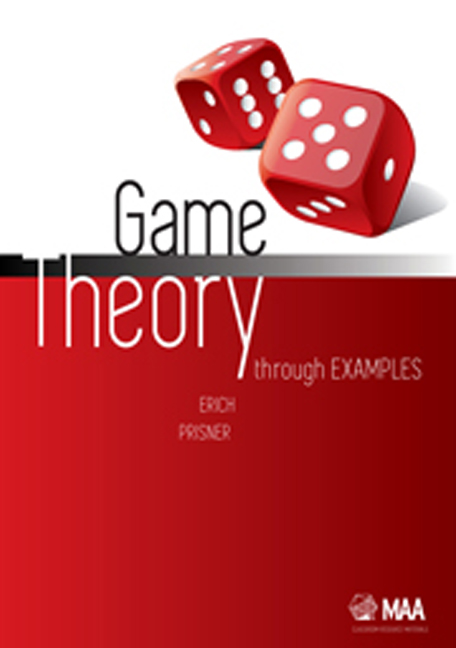Book contents
- Frontmatter
- Contents
- Preface
- 1 Theory 1: Introduction
- 2 Theory 2: Simultaneous Games
- 3 Example: Selecting a Class
- 4 Example: Doctor Location Games
- 5 Example: Restaurant Location Games
- 6 Using Excel
- 7 Example: Election I
- 8 Theory 3: Sequential Games I: Perfect Information and no Randomness
- 9 Example: Dividing A Few Items I
- 10 Example: Shubik Auction I
- 11 Example: Sequential Doctor and Restaurant Location
- 12 Theory 4: Probability
- 13 France 1654
- 14 Example: DMA Soccer I
- 15 Example: Dividing A Few Items II
- 16 Theory 5: Sequential Games with Randomness
- 17 Example: Sequential Quiz Show I
- 18 Las Vegas 1962
- 19 Example: Mini Blackjack and Card Counting
- 20 Example: Duel
- 21 Santa Monica in the 50s
- 22 Theory 6: Extensive Form of General Games
- 23 Example: Shubik Auction II
- 24 Theory 7: Normal Form and Strategies
- 25 Example: VNM POKER and KUHN POKER
- 26 Example: Waiting for Mr. Perfect
- 27 Theory 8: Mixed Strategies
- 28 Princeton in 1950
- 29 Example: Airport Shuttle
- 30 Example: Election II
- 31 Example: VNM POKER(2, r, m, n)
- 32 Theory 9: Behavioral Strategies
- 33 Example: Multiple-Round Chicken
- 34 Example: DMA Soccer II
- 35 Example: Sequential Quiz Show II
- 36 Example: VNM POKER(4, 4, 3, 5)
- 37 Example: KUHN POKER(3, 4, 2, 3)
- 38 Example: End-of-Semester Poker Tournament
- 39 Stockholm 1994
- Bibliography
- Index
28 - Princeton in 1950
- Frontmatter
- Contents
- Preface
- 1 Theory 1: Introduction
- 2 Theory 2: Simultaneous Games
- 3 Example: Selecting a Class
- 4 Example: Doctor Location Games
- 5 Example: Restaurant Location Games
- 6 Using Excel
- 7 Example: Election I
- 8 Theory 3: Sequential Games I: Perfect Information and no Randomness
- 9 Example: Dividing A Few Items I
- 10 Example: Shubik Auction I
- 11 Example: Sequential Doctor and Restaurant Location
- 12 Theory 4: Probability
- 13 France 1654
- 14 Example: DMA Soccer I
- 15 Example: Dividing A Few Items II
- 16 Theory 5: Sequential Games with Randomness
- 17 Example: Sequential Quiz Show I
- 18 Las Vegas 1962
- 19 Example: Mini Blackjack and Card Counting
- 20 Example: Duel
- 21 Santa Monica in the 50s
- 22 Theory 6: Extensive Form of General Games
- 23 Example: Shubik Auction II
- 24 Theory 7: Normal Form and Strategies
- 25 Example: VNM POKER and KUHN POKER
- 26 Example: Waiting for Mr. Perfect
- 27 Theory 8: Mixed Strategies
- 28 Princeton in 1950
- 29 Example: Airport Shuttle
- 30 Example: Election II
- 31 Example: VNM POKER(2, r, m, n)
- 32 Theory 9: Behavioral Strategies
- 33 Example: Multiple-Round Chicken
- 34 Example: DMA Soccer II
- 35 Example: Sequential Quiz Show II
- 36 Example: VNM POKER(4, 4, 3, 5)
- 37 Example: KUHN POKER(3, 4, 2, 3)
- 38 Example: End-of-Semester Poker Tournament
- 39 Stockholm 1994
- Bibliography
- Index
Summary
The 2001 movie “A Beautiful Mind” focused on game theorist John F. Nash and was a huge success, winning four Academy Awards. It is based on Sylvia Nasar's unauthorized biography with the same title, published in 1998. There is an amazing passage in the book, which unfortunately was left out of the movie. It is where Nash visited John von Neumann in his office to discuss the main idea and result of the Ph.D. thesis he was writing. At the time Nash was a talented and promising mathematics student at Princeton University and von Neumann was a professor at the Institute for Advanced Study in Princeton, a member of a handful of mathematicians of the highest distinction. Albert Einstein was a colleague. According to the book's description of the meeting, based on an interview with Harold Kuhn, the visit was short and ended by von Neumann exclaiming: “That's trivial, you know. That's just a fixed point theorem” [N1998].
Reading the scene, I see the two men, one eager to impress with his theorem, the other seeming to try to not be impressed. Both men were competitive, more than what may be normal for mathematicians. Although few can answer difficult mathematical questions, many can tell right from wrong answers. For instance, solving an equation may be hard, but checking whether a number is a solution is easy. For this reason, contests are much more frequent in mathematics than in other academic areas. In the 16th century, mathematicians challenged each other, posing questions that they hoped would show their superiority. Nowadays, there are many mathematical contests for students, Putnam Exams, national and international Mathematical Olympiads, and others. For adult mathematicians, there is the game of challenging each other with conjectures, and winning by being the first to prove or disprove one.
- Type
- Chapter
- Information
- Game Theory Through Examples , pp. 212 - 214Publisher: Mathematical Association of AmericaPrint publication year: 2014

